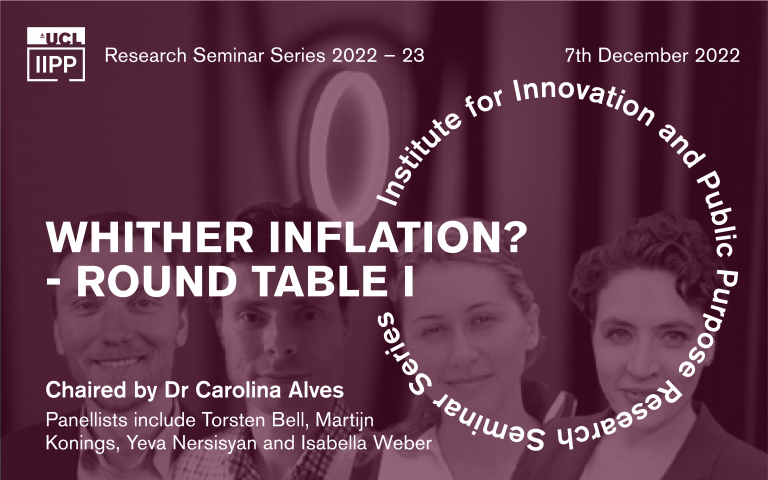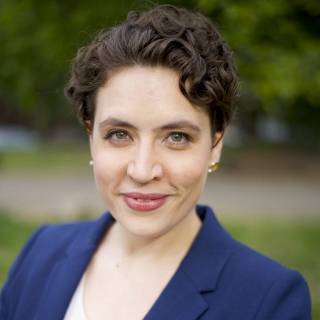Whither Inflation? - Round Table I
07 December 2022, 5:00 pm–6:30 pm

Join us to hear a round table discussion between Torsten Bell, Chief Executive of the Resolution Foundation; Yeva Nersisyan Research Scholar, Global Institute for Sustainable Prosperity and Associate Professor of economics, Franklin and Marshall College; and Isabella Weber, PERI Research Associate and Research Leader in China Studies; Assistant Professor of Economics. This talk will be chaired by IIPP’s Dr Carolina Alves followed by questions from the audience.
This event is free.
Event Information
Open to
- All
Availability
- Yes
Cost
- Free
Organiser
-
IIPP Comms
- Guest Speakers: Torsten Bell, Yeva Nersisyan and Isabella Weber
- Chair: Dr Carolina Alves
Background material linked to this seminar:
Konings, M. (2022). The Asset Economy Strikes Again. Boston Review.
Nersisyan, Y. and Wray, L. R (2022) Is it Time for Rates Hikes? The Fed cannot Engineer a Soft Landing but Risks Stagflation by Trying. Public Policy Brief, 157, Levy Economics Institute of Bard College.
Nersisyan, Y. and Wray, L. R (2022) What’s Causing Accelerating Inflation Pandemic or Policy Response? Working Paper, 1003, Levy Economics Institute of Bard College.
Nersisyan, Y. and Baker, D. Agree to Disagree: Can the Fed Manage a Soft Landing? Podcast: Intelligence Squared U.S. Debates.
Weber, I. M., Jauregui, J.L., Teixeira, L., and Nassif Pires, L. (2022). Inflation in Times of Overlapping Emergencies: Systemically Significant Prices from an Input-output Perspective. Economics Department Working Paper Series. 340.
This in person event will take place at 11 Montague Street, London, WC1B 5BP.
About the Speakers
Torsten Bell
Chief Executive at Resolution Foundation

Martijn Konings
Professor of Political Economy and Social Theory at The University of Sydney

Material: https://bostonreview.net/articles/the-asset-economy-strikes-again
More about Martijn KoningsYeva Nersisyan
Research Scholar and Associate Professor of economics at Global Institute for Sustainable Prosperity and Franklin and Marshall College

Isabella Weber
Research Associate and Research Leader in China Studies; Assistant Professor of Economics at Political Economy Research Institute

Dr Carolina Alves
Associate Professor in Economics at UCL Institute for Innovation and Public Purpose
Carolina specialises in macroeconomics and international political economy, with regional expertise in Latin America.
Carolina joins IIPP from Girton College at the University of Cambridge where she was the Joan Robinson Research Fellow in Heterodox Economics and a College Teaching Officer at the Faculty of Economics. At Cambridge, she led teaching in macroeconomics, political and social aspects of economics, and history and philosophy of economics, while also being the Director of Studies for Economics for second-year undergrads, and a member of Girton’s College Council responsible for the stewardship of the College.
Carolina is the co-founder of Diversifying and Decolonising Economics – a network of economists working to promote inclusiveness in economics in both the academic content and the field’s institutional structures. She is a member of the Rebuilding Macroeconomics Advisory Group - a research initiative aimed at re-invigorating macroeconomics and bringing it back to the fore as a policy-relevant social science, as well as being the co-editor for the Developing Economics blog, which takes a critical approach to creating discussion and reflection in the field of economics. She is also a board member on the Progressive Economy Forum Council (PEF) and Positive Money.
 Close
Close

